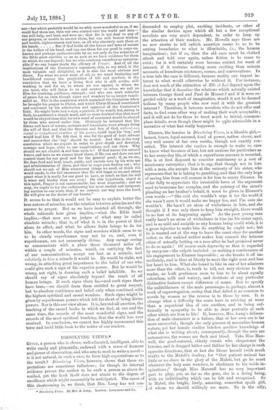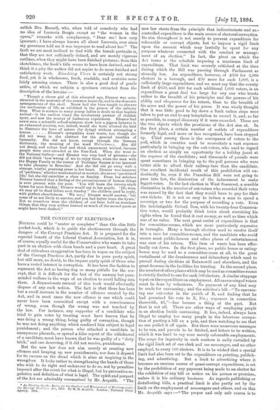DISSOLVING VIEWS.*
GivEN, a person who is clever, well-educated, intelligent, able to write easily and pleasantly, endowed with a sense of humour and power of observation, and who sets to work to write a novel— is it not natural, in such a case, to form high expectations as to the result ? Dissolving Views, however, shows that these ex- pectations are sometimes fallacious ; for though its internal evidence proves the author to be such a person as above de- scribed, yet the book itself does not attain to the degree of excellence which might reasonably be anticipated. The cause of this shortcoming is, we think, that Mrs. Lang has not con- • Dissolting Views. By Mrs. A. Lang. London: Longman and Co. descended to employ plot, exciting incidents, or other of the similar devices upon which all but a few exceptional novelists are very much dependent, in order to keep up the attention of their readers. Mr. Howells says there are no new stories to tell (which assertion seems to us to be setting boundaries to what is illimitable, i.e., the human imagination); but if so, then the old ones must be clothed afresh and told over again, unless fiction is to cease to exist ; for it will certainly soon become extinct for want of interest, if it contains nothing more exciting than minute accounts of humdrum existences, scenes, and conversations. In a true tale the case is different, because reality can impart in- terest to what would otherwise be without it. For instance, does not much of the attraction of Elle el Lai depend upon the knowledge that it describes the relations which actually existed between George Sand and Paul de Musset ? and if it were re- garded solely as a work of imagination, would it not be deemed tedious by many people who now read it with the greatest interest? Therefore, it behoves novelists who do not offer real facts, to find some other way of making their work acceptable ; and it will not do for them to trust much to trivial, common- place details, even though these might be quite admissible in a narrative of what had really happened.
Eleanor, the heroine in Dissolving Views, is a likeable girl,— honest, brave, loyal-natured, fond of power, rather clever, and very well aware of her own merits, though not exactly con- ceited. The interest she excites is enough to make us care to know what becomes of her, but not anxious for particulars as to her every-day life, of which a superfluous amount is recorded. She is at first disposed to consider matrimony as a sort of missionary enterprise ; that is to say, that though not in love with a man, she accepts him at the entreaty of his sister, who represents that he is taking to gambling, and that the only hope of saving him from evil courses is for him to marry Eleanor. In order fully to appreciate the irresistible force of the argument used to 'overcome her scruples, and the potency of the sister's pleading on her brother's behalf, it must be given in Eleanor's own words :—" She said she wouldn't urge it for the world if she wasn't sure it would make me happy too, and I'm sure she wouldn't. He hasn't an atom of wickedness in him, and she thought if I was only there to keep him straight, there would be no fear of its happening again." As the poor young man really hasn't an atom of wickedness in him (as his sister says), and is as mild and amiable as any human being could wish, it is a gross injustice to make him do anything he ought not ; but he is wanted out of the way to leave the coast clear for another suitor, so the unkind author makes him commit the heinous crime of actually betting on a race after he had promised never to do so again ! Of course such depravity as that is regarded by everyone—the culprit included— as making a continuance of his engagement to Eleanor impossible ; so she breaks it off im- mediately, and is thus at liberty to meet the right man and lose her heart to him. What she found to like in one of her admirers more than the other, is, truth to tell, not very obvious to the reader, as both gentlemen seem to him to be about equally colourless, milk and watery, and destitute of any particular distinctive feature except difference of name. But to specify the unlifelikeness of the male personages is, perhaps, almost a work of supererogation, seeing that that defect is as common to novels by women as the reverse is to those by men. It is strange what a difficulty the sexes have in arriving at more than a superficial idea of one another, and in being suf- ficiently in sympathy to be able to draw portraits of each other which are true to life ! If, however, Mrs. Lang's delinea- tion of male characters is a failure, that of her own sex is far more successful ; though she only guesses at masculine human nature, yet her female studies betoken positive knowledge of what she is writing about ; consequently, though the men are automatons, the women are flesh and blood. Take Miss Max- well, the good-natured, elderly cousin who chaperones the heroine, and is dragged hither and thither by her charge in such opposite directions, that at last she likens herself (with much truth) to the Mandi's donkey, for " that patient animal has little or no share in the glory of the Mandi, but go he must wherever the holy man wanders, in obedience to his 'noble in- spirations ;" though Miss Maxwell has no very important part to play, yet, as far as she goes,. she is a living being, with an individuality which can be felt and recognised. So is Mabel, the bright, lively, amusing, somewhat spoilt girl, of whom we should willingly see more. So is the silly, selfish Mrs. Russell, who, when told of somebody who had no idea of Lucrezia Borgia except as "the woman in the opera," remarks with complacency, " Dear me ! how very ignorant ; I have always known all about Lucrezia, ever since my governess told me it was improper to read about her." The fault we are most inclined to find with the female portraits is, that they are not sufficiently defined, and are merely vigorous outlines, when they might have been finished pictures ; from this sketchiness, the book's title seems to have been derived, and we think it a pity the author did not aspire to do more finished and satisfactory work. Dissolving T'iews is certainly not strong food, yet it is wholesome, fresh, readable, and contains some fairly amusing scenes. There is also a good deal of gentle satire, of which we subjoin a specimen extracted from the description of the heroine :— " Though a clever girl of this educated age, Eleanor was unin- structed in the anatomy of the common house-fly, and in the domestic arrangements of the snail. Never had she been taught to observe the mechanism of life, as exhibited in the person of the unlucky frog. What is science to many young ladies is death to that hapless animal—in the earliest times the involuntary partner of childish sport, and now the martyr of barbarous experiment. Eleanor had never seen a scientific school-mistress show how a pigeon behaves in an exhausted receiver, nor, indeed, would she have allowed the bird to illustrate the laws of nature (by dying) without attempting a rescue Eleanor's sympathies were warm, too, though she did not weep in the abstract for the general troubles of humanity. She did not know, except through the German dictionary, - the meaning of the word Weitschmer•z. She did not droop, and refuse food and think amusement wicked, because people were over-crowded at the East-End. When she went to the National Gallery—and Eleanor was very fond of pictures—she did not think how wrong of me to enjoy them, when the man with the Happy Family at the corner of Trafalgar Square is too ignorant to take pleasure in Bronzino.' And she did not go away with a strange, wistful, yearning sense in her heart. Eleanor was innocent of problems,' whether mathematical or mental ; she never ' questioned life,' but she did catechise a class on Sunday. From her scholars Eleanor learned that a feeling of the precariousness of human things is ever present with the poor. Yon will learn the twenty-ninth hymn for next Sunday,' Eleanor would say to her pupils. Oh, miss, we may all be dead before next Sunday !' the children used lo reply, with perfect cheerfulness. We may,' Eleanor would answer, but some of ns are likely to survive, and you had better learn the hymn.' But so conscious were the children of our faint hold on mundane things, that they very seldom learned as much of the sacred poem as might have been desired."

































 Previous page
Previous page